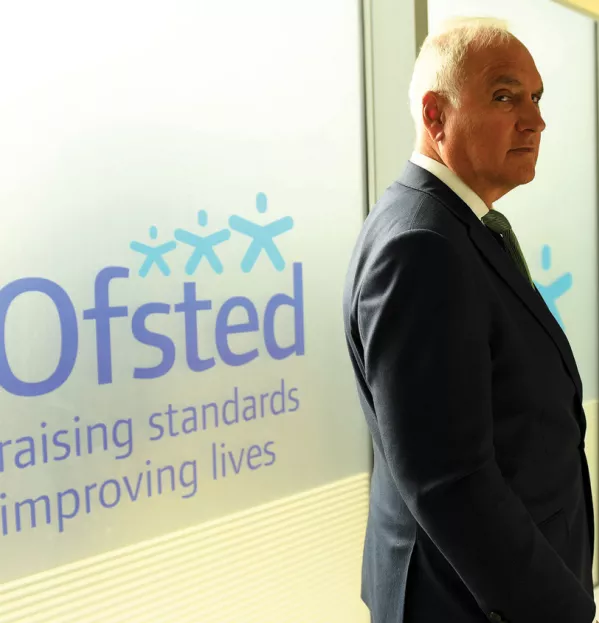Sir Michael bows out as a true pupils’ champion

Sir Michael Wilshaw’s speech at the launch of his fifth and final annual report provided a timely opportunity to take stock of the progress of the education system in England - and of Ofsted itself - over his term of office.
Both in his speech on 1 December and in the report, Her Majesty’s Chief Inspector of schools and children’s services showed all the qualities for which he has become nationally known since he took up the role in 2011: an uncompromising focus on raising standards of education; giving praise where it is due; criticising both the government and the teaching profession, where he believes they are falling short; championing the disadvantaged; using his own experience as a headteacher to underpin his judgements; and believing that, if London could improve from the worst region in England to the best in 10 years, other areas could make a similar leap forward.
During the history of Her Majesty’s Inspectorate (HMI), all the great chief inspectors have stood between the government and the profession, speaking out on the basis of evidence, without fear or favour, about the shortcomings of both individual schools and the system as a whole. Great leaders of HMI have been tough on poor performance, whether it is found in state schools, independent schools, colleges, children’s services, or in the actions of the government itself.
Sir Michael was never going to be the secretary of state’s puppet
Persuaded by Michael Gove to step up to the role of chief inspector at an age well beyond when most heads and teachers are retiring, Sir Michael was never going to be the secretary of state’s puppet. They soon fell out, notably over Mr Gove’s politically driven decision not to renew the contract of the chair of the Ofsted board, Baroness Sally Morgan.
Ofsted ‘requires improvement’
Sir Michael has continued to speak truth to power throughout his time in office. The latest examples of this evidence-informed bluntness are his opposition to the expansion of grammar schools on the grounds that they would do nothing to improve social mobility or the quality of education across the system and his criticism of the government for its laissez-faire approach to teacher recruitment, which is causing major problems in so many schools.
Ofsted itself has been changed since 2011; Sir Michael’s greatest achievement in this area has been the bringing of inspections in-house, in response to continuing criticism of the varying standard of school inspections.
Apart from the ever-changing inspection framework, he has changed the judgement of “satisfactory” to “requires improvement”, with the clear implication that nothing less than “good” is good enough; he has also improved Ofsted’s on-the-ground knowledge of school context by appointing leading HMIs as regional directors, with a strong direction from the centre to drive improvement in their areas.
Inspectors do not always make the correct judgement on a school
Inspectors do not always make the correct judgement on a school, sometimes with devastating consequences. So there is still room for improvement under Sir Michael’s successor, Amanda Spielman. Inspection should always be data-informed, but it is currently too data-driven. It should always be a judgement of the quality of education in a school, but this judgement is too often too narrow.
As Stephen Tierney of thinktank the Headteachers’ Roundtable has written: “We need a valid, reliable and consistent inspection service which recognises the good work done by many schools and leaves them alone to get on with it. Scarce inspection resources should be focused on the few persistently underperforming schools and focused more on improvement.”
The relationship between inspection and peer review - now carried out independently at many schools - should be stronger. There is some way to go before we have intelligent accountability in every aspect of our system.
No previous chief inspector has had as much experience of school leadership as Sir Michael. Education professionals may not always have agreed with him or liked what he said, but respect for him has grown during his term of office. Schools have improved greatly since 2011; so has the inspection process.
As Sir Michael’s term of office comes to an end, my most positive reflection on his work is his strong advocacy on behalf of disadvantaged young people. In particular, I recall his 2013 report on disadvantage in schools, Unseen Children: access and achievement 20 years on, two decades after the landmark HMI report on the same topic. The poorest members of society need champions to fight for them and nobody has done this more effectively than Sir Michael Wilshaw.
John Dunford is chair of Whole Education, and has formerly been a headteacher, general secretary of the Association of School and College Leaders and national pupil premium champion. His book, The School Leadership Journey, is out now. He tweets as @johndunford
You need a Tes subscription to read this article
Subscribe now to read this article and get other subscriber-only content:
- Unlimited access to all Tes magazine content
- Exclusive subscriber-only stories
- Award-winning email newsletters
Already a subscriber? Log in
You need a subscription to read this article
Subscribe now to read this article and get other subscriber-only content, including:
- Unlimited access to all Tes magazine content
- Exclusive subscriber-only stories
- Award-winning email newsletters